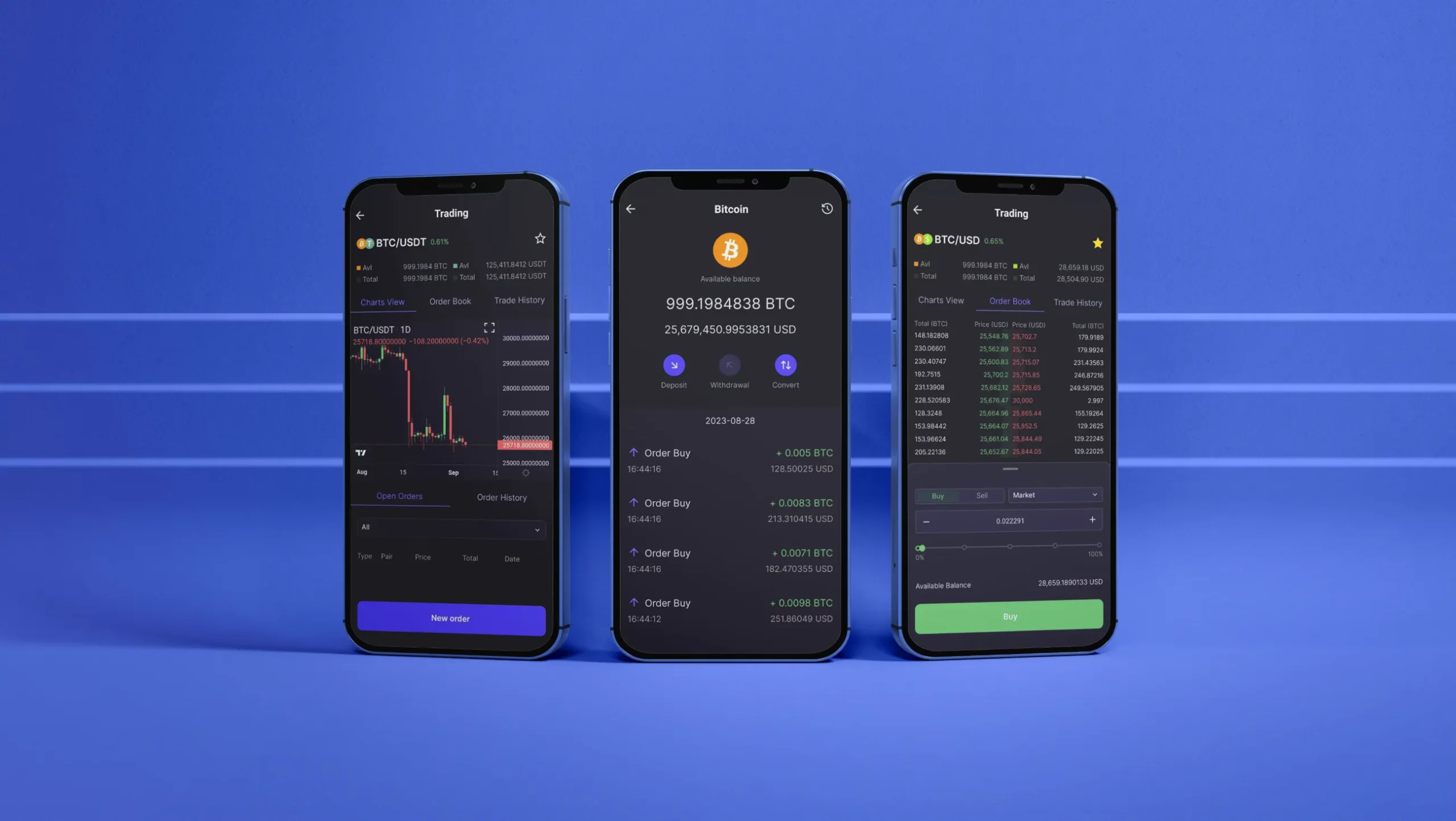- Crypto Solutions
- By business model
- By auction model
- Services
- Case studies
- Contact
The cryptocurrency landscape is complex, diverse and constantly evolving. For entrepreneurs who want to launch a cryptocurrency project—exchange, wallet, OTC desk, etc.— the right jurisdiction for operation is critical. In this article we will compare the two regions, the EU and US, focusing on factors such as regulatory clarity, speed to market and operational costs.
Favorable Ground
The European Union and United States are two major financial markets that offer different sets of opportunities and challenges for cryptocurrency businesses. Starting business in the US has vivid advantages:
- A large customer base,
- Established financial markets.
Launching a crypto exchange project in the EU offers certain advantages as well:
Regulatory Clarity
EU regulations aim to be harmonized across member states, which makes it easier to operate in multiple countries. Plus, some EU countries offer regulatory sandboxes to test financial innovations in a controlled environment, providing a smoother entry into the market.
Global scale
Any of the EU issued crypto licenses—except for Estonia and Czech Republic—allows operating a crypto exchange worldwide. This rule works even outside the EU in places with no local crypto regulation.
Speed to Market
In European countries, the process of acquiring the necessary licenses is significantly quicker than in the US. In the EU it takes from 1 to 2 months on average.
Lower Costs
The cost of doing business—including legal fees, salaries and rent—may be lower than in the US. Additionally, EU jurisdictions have less stringent capital requirements, making it easier for startups to enter the market. Initial costs for the EU crypto license are EUR 15,000–20,000 + 35% from the EUR 125,000 share capital requirement.
Business-Friendly Environment
Places like Estonia are known as tech hubs that foster a conducive environment for startups. Besides, with its commitment to free movement of labor, the EU can offer a larger, diverse talent pool.
Convenient Taxation
Some EU countries offer VAT exemptions for cryptocurrency transactions. Moreover, corporate tax rates can be more favorable in EU countries than in the US. More about taxes below in this article.
Comparison Table: EU and US Requirements

EU vs. US: Time, Costs, Complexity
The time, difficulty and financial levels for launching a crypto project differ between the European Union and the United States.
Time
- EU: Depending on the jurisdiction within the EU, the approval process can be quicker. For instance, Lithuania, Poland, Czech Republic have been known for a more streamlined process that can take 1–2 months for crypto-specific licenses;
- US: The process tends to be more prolonged, often taking upwards of 6–12 months. This is mainly due to stringent regulatory requirements, particularly at the state level. For example, the BitLicense in New York can take a considerable amount of time to secure.
Complexity
- EU: The regulatory environment in the EU is more lenient, depending on the member state. This can make it easier to start;
- US: The regulatory environment is often stricter. Compliance can be complex due to federal laws and state-by-state regulations, making the overall process more challenging.
Costs
- EU: Costs are lower, especially in jurisdictions with more relaxed regulations. Some countries feature a more affordable cost of living, lower corporate taxes and lower personnel costs;
- US: Costs are higher due to strict regulations, higher legal fees and extensive documentation and compliance. The cost of securing additional licenses like the BitLicense can also add to the costs.
Comparison Table: Time, Complexity, Costs

Most Favorable Countries for Crypto Business
- Lithuania is a top European destination for crypto businesses due to its simple, fast licensing process and progressive regulations in line with the MiCa Directive. You must pay the €125,000 authorized capital in installments, that starts with a 35% down payment;
- Estonia offers a quick, efficient crypto license process with EU-wide applicability and low taxes. Cryptocurrencies are legally on par with fiat, which guarantees regulatory clarity;
- Poland recently introduced virtual asset regulations, requiring companies to register in a state crypto register. The registration is straightforward and quick. In addition, Poland has concluded tax treaties with 84 countries, making it tax-favorable for crypto businesses;
- The Czech Republic doesn’t have specific crypto licensing but requires registration within the Trade Licensing Registry for legal operation across the EU. There’s no need for a corporate account. The minimum capital is 1 CZK per shareholder.
Comparison Table

How to Launch Crypto Exchange or Wallet in EU?
Step 1: Market Research and Planning
Research the crypto market. Develop a detailed business plan that outlines your project’s goals, target audience, revenue model, and growth strategy. Choose jurisdiction. Select the EU member state you want to get a license from. Consider the above-mentioned factors.
Step 2: Financial and Operational Setup
Establish relationships with EU-based banks for fiat currency operations. Develop robust AML and KYC procedures in line with EU regulations. Build or acquire a secure WL technology infrastructure, including a cryptocurrency trading platform, crypto wallets, crypto OTC desks and cybersecurity measures. Ensure compliance with EU data protection regulations (GDPR).
Step 3: Tax and Accounting
Consult with tax professionals to understand and comply with EU tax regulations: VAT and capital gains tax. Consider how you will report and pay taxes. Implement proper accounting and financial reporting practices to adhere to EU standards. Consider hiring a local accountant or firm familiar with EU accounting rules.
Step 4: Security and Risk Management
Prioritize the security of user funds and data. Conduct regular security audits and penetration testing. Engage cybersecurity experts to ensure robust defenses against threats. Develop risk management strategies to mitigate cryptocurrency price volatility and market risks. Consider obtaining insurance coverage to protect against losses.
Step 5: Customer Support and Marketing
Provide excellent customer support in the local language(s) of your target market. Develop a marketing strategy tailored to your EU target audience. Leverage local marketing channels, social media and partnerships to promote your platform.
Step 6: Launch and Ongoing Compliance
After obtaining the necessary regulatory approvals and licenses, launch your crypto project and continuously monitor and adapt to changes in the regulatory landscape and market conditions.
White Label Solutions
The process of launching a cryptocurrency project is complex, involving a labyrinth of regulatory, financial and technical considerations. These challenges depend on the jurisdiction, with the European Union often appearing more favorable due to its clearer regulatory environment and lower operating costs.
Given the challenges outlined above, it may be worth considering specialized providers that aim to mitigate these hurdles. Merkeleon offers such a solution. We have been offering white-label cryptocurrency exchange & wallet software solutions since 2014, focusing on providing a scalable platform that caters to advanced traders and newcomers.
Merkeleon helps to acquire necessary licenses, particularly in EU jurisdictions, and open bank accounts. Also, Merkeleon has developed a white-label ecosystem infrastructure allowing operators to grow users’ community offering multiple services within one place:
- Fiat to crypto exchange,
- Wallet,
- OTC desk,
- Spot trading,
- Margin trading,
- Earn module,
- Gamification,
- Initial token sales,
- Crypto marketplace.
All of these can be connected into a seamless solution with a single login and unified user balance.
Our company and trusted partners take care of all the essential components, ensuring a hassle-free experience for operators, from legal and technical set-up to ongoing support and maintenance. Book an exploratory meeting with our specialists following this link or book a demo via our website.







